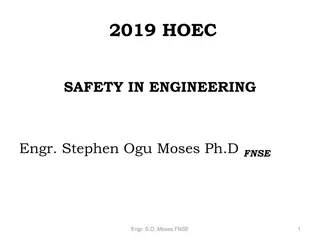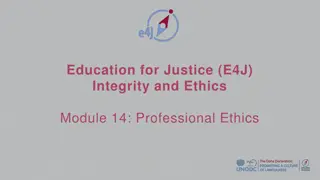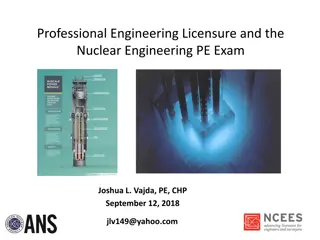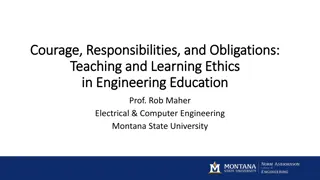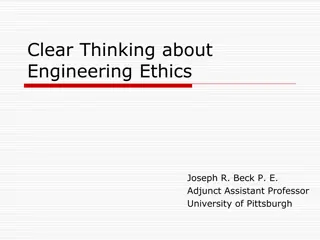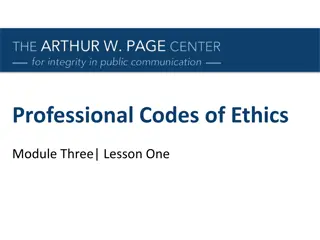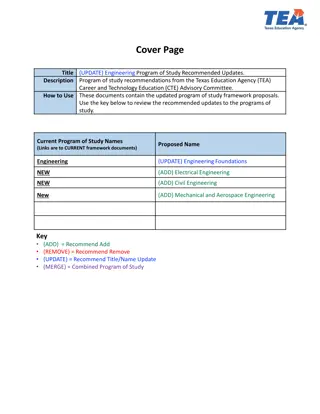Professional Ethics in Engineering
Exploring the essence of professional ethics in the field of engineering, this chapter delves into the responsibilities of engineers towards society and the global community. It emphasizes the importance of competency, maturity, and the correct attitude required for engineers to practice their profession effectively, whether as employees or employers within a team dynamic. The discussion covers the engineer's role as a professional, the ethical codes guiding their actions, and real-world case studies showcasing ethical dilemmas in engineering practice.
Download Presentation

Please find below an Image/Link to download the presentation.
The content on the website is provided AS IS for your information and personal use only. It may not be sold, licensed, or shared on other websites without obtaining consent from the author.If you encounter any issues during the download, it is possible that the publisher has removed the file from their server.
You are allowed to download the files provided on this website for personal or commercial use, subject to the condition that they are used lawfully. All files are the property of their respective owners.
The content on the website is provided AS IS for your information and personal use only. It may not be sold, licensed, or shared on other websites without obtaining consent from the author.
E N D
Presentation Transcript
CHAPTER 3 PROFESSIONAL ETHICS
Chapter 3 Professional Ethics At the end of this chapter, students should be able to Identify and discuss professional engineering ethics 2
3.0 Professional Ethics Contents 3.1 The Engineer as a Professional Man 3.2 Engineering Ethics and Professionalism 3.3 Code of Ethics 3.4 Engineers and Society 3.5 Global Ethics in Engineering Organizations 3.6 Case Studies
3.1 The Engineer as a Professional Man Engineering is predominantly an employee profession Absence of a personal practitioner-client relationship The whole community is the ultimate client rather than the individual clients as in the case with other professions The experiential learning is what develops competency and maturity for one cannot exist without the other. 5
3.1 The Engineer as a Professional Man For an individual to be regarded as a professional engineer, he must not only be academically qualified but also have the level of maturity & correct attitude and able to demonstrate competency levels befitting that required by the discipline. 6
3.1 The Engineer as a Professional Man Engineers tend to practice their profession as members of a team Led and managed by senior engineers who are employees Even though they also assume the role of employers in many aspects of their relationships with their juniors 7
3.1 The Engineer as a Professional Man The more senior engineers tend to be concerned with the leadership and management of large resources of men, materials and finance over which they have control The juniors will be more involved in the detailed technical practice of the profession 8
3.1 The Engineer as a Professional Man In today s context in major organizations the technical direction comes from higher boards that are formed within the organization to provide guidance and direction in line with the organization s over arching goals and objectives These directions and guidelines cascade down to the middle management who translates the actions and the lower rung to execute the action plans 9
3.1 The Engineer as a Professional Man This is done so because of the complexity of goals that necessitates the participation of other elements such as finance, supply chain, legal and human resource that are not necessarily engineering per se 10
3.1 The Engineer as a Professional Man Management implies responsibility and in engineering management, the professional engineer is responsible in a very direct sense for control over the resources of the community Engineering therefore, is a unique profession in which all of the marks of the professional man have crucial importance: He must have high-level skills and he must develop different skills as his career advances He must have a strong motivation for service because everything he does impinges on the community in some way or other 11
3.2 Engineering Ethics & Professionalism
3.2 Engineering Ethics & Professionalism Engineering is closely involved in human relations in both Public and Private sectors A great many of the special problems in personal conduct met by engineers are likely to arise from this fact Most engineers encounter problem that far removed from the technical and impersonal 13
3.2 Engineering Ethics & Professionalism Engineering extends the engineers influence on all sphere of human activities In this respect, personal attitudes, relationships and conduct of the engineers have a significant reaching far beyond the realm of purely personal moral Therefore the code of ethics is important To provide guidance for the conduct in all aspect of professional life. 14
3.2 Engineering Ethics & Professionalism Morality refers to those standards of conduct that apply to everyone rather than only to members of a special group such as Don tCheat , Keep your promises etc Ethics mean something more than law and moral , it carries an additional connotation of rightness The code is not: A list of rules to govern every problem of conduct A broad statement of ideals 15
3.2 Engineering Ethics & Professionalism Professional Ethics refer to those special morally permissible standards of conduct that, ideally, every member of a profession wants every other member to follow, even if that would mean having to do the same. Professional Ethics is the category of social and moral awareness of the implication or effects of one s job on the wider community and environment 16
3.2 Engineering Ethics & Professionalism Engineering ethics is professional ethics and sets the standard for professional practice Professional Ethics + Standards for Professional Practice Engineering Ethics 17
3.2 Engineering Ethics & Professionalism Skills related to engineering ethics Moral awareness Cogent (well-argued) moral reasoning Moral coherence Moral communication Moral reasonableness Respect for persons Tolerance of diversity 18
3.2 Engineering Ethics & Professionalism Ethical dilemmas, or moral dilemmas : situations in which reasons conflict, or in which the application of moral values is problematic, and it is not immediately obvious what should be done Steps in resolving ethical dilemmas : Moral clarity : Identify the relevant moral values Conceptual clarity 19
3.2 Engineering Ethics & Professionalism Informed about the facts: Obtain relevant information Informed about the options: Consider all genuine options Well-reasoned: Make a reasonable decision Right-wrong, better-worse Some ethical dilemmas have solution that are either right (obligatory) or wrong (morally forbidden) other dilemmas have more that one permissible solution, some of which are better or worse that others either in some respects or overall 20
3.2 Engineering Ethics & Professionalism The meanings of Responsibility: Obligations Are the types of actions that are morally or legally mandatory Some obligations are incumbent on each of us, such as to be honest, fair, and decent Other obligations are role responsibilities, acquired when we take on special roles such as parents, employees, or professionals Morally admirable engineers accept their obligations and are conscientious in meeting them. 21
3.2 Engineering Ethics & Professionalism Accountable Being answerable for meeting particular obligations, that is, liable to be held to account by other people in general or by specific individuals in positions of authority We can be called upon to explain why we acted as we did, perhaps providing a justification or perhaps offering reasonable excuses Duty of care A legal obligation imposed on an individual requiring that they adhere to a standard of reasonable care while performing any acts that could foreseeable harm others It is the first element that must be established to proceed with an action in negligence 22
3.2 Engineering Ethics & Professionalism Wrongdoing Voluntary Wrongdoing Voluntary actions occur when we knew what we were doing was wrong and we were not coerced Some voluntary wrongdoing is recklessness, that is, flagrant disregard of known risks and responsibilities Other voluntary wrongdoing is due to weakness of will, whereby we give in to temptation or fail to try hard enough 23
3.2 Engineering Ethics & Professionalism Negligence Negligence occurs when we unintentionally fail to exercise due care in meeting responsibilities We might not have known what we were doing, but we should have 24
3.3 Code of Ethics The Code of Ethics is a statement of the principles of rightness , of broad scope and with enough detail to enable the reader to have an understanding of the requirements and its compliance The Codes of Ethics for Engineers state the moral responsibilities of engineers as seen by the profession and as represented by a professional society 26
3.3 Code of Ethics The essence of all professional codes is that the professional must be worthy, through his conduct, of the trust placed in him by the community and his colleagues and translating into morally justified actions all the time 27
3.3 Code of Ethics It is about the upholding and adherence to the good values that are impregnated in the codes to do goodness and not anything that is detrimental and degrading to the profession and to the very least the individual 28
3.3 Code of Ethics Values such as integrity, honesty, sympathy, upholding human rights, preserving humanity and its environment etc are only some that contribute to the foundation of the codes 29
3.3 Code of Ethics This has given rise to a universal rule of life for every engineer who is aspired to the true professional status: To act in every situation in a manner that will add to the confidence and esteem in which his profession is held by the community 30
3.3 Code of Ethics This universal rule has resulted that engineering profession has remarkably few cases of breach of ethics requiring disciplinary action against members Universal set of qualities which pertain to any job or occupation:- Dedication Diligence Honesty 31
3.3 Code of Ethics Second set of positive qualities are those which are particular to the job or occupation at hand:- A teacher must have the ability to communicate effectively with her pupils Some are gifted with specific qualities, but many have to learn and develop 32
3.3 Code of Ethics The whole social system has a large hand in determining the wider effect of one s work. But this does not means that one completely paralyzed. Eg. Environmental impact assessment can be more seriously considered by architects, engineers and developer and not seen as extraneous program. Economists and economic advisers can look more at human side of the economy and that the needs of the poor have priority over the wants of the rich and that the rights of the workers are more important than the maximization of profit. 1997-98 Indonesian experience France revolution (initiated 1789) 33
3.3 Code of Ethics The third set is the social and moral awareness of the implication or effect of ones job on the wider community and environment. Where professional ethics cannot be avoided A researcher cannot absolve himself of moral implication of his work simply by taking decisions according to some kind of purely scientific criteria devoid of value implication A general massing his army at the border of his country for some military exercise without consenting the neighbouring country. 34
3.3 Code of Ethics The fact is that:- All of us exist in social context which does not disappear however much one wants to be uninvolved The third set of professional ethic is a very difficult to dealt with. One cannot escape the fact the one s work will effect the wider community. Yet one (to a large extent) does not have complete control over many factors that dictate the course of one s action or decisions in a work. 35
3.3 Code of Ethics We can conclude that moral responsibilities need to become an integral part of popular professional ethics. Had I known, I would rather have been a watchmaker Einstein on Hiroshima and Nagasaki (Example of moral responsibility) 36
3.3 Code of Ethics The fact that engineer s work and relationships with colleagues and clients are so much in the open that are purely moral sanctions prove to be sufficient and this a matter of pride A profession is no better than its individual member 37
3.3 Code of Ethics When we speak of a Code of Ethics, we are not talking about law. In the Code of Ethics, our concern is with what is morally right or wrong and not compromising the legal standing Situations which require the Professional Engineer to consider the morality of his actions arise under circumstances in which they may exist conflict of interest between the individual professional and any or all of the entities with which he has to interact i.e. Community, Employer, Clients and/or Peers 38
3.3 Code of Ethics The professional owes a duty of care towards those he serves in ensuring that their interests are protected, and in this respect, there is a guideline which is what the Code of Ethics is all about The essential roles of codes of ethics: serving and protecting the public providing guidance offering inspiration establishing shared standards contributing to education deterring wrongdoing strengthening the profession s image 39
3.3 Code of Ethics The three major Professional Engineering bodies in Malaysia have complementary functionsin the regulation of professional conduct All three bodies have their own Code of Ethics designed to suit their specific requirements according to the objectives for which each body is constituted: IEM Code of Ethics BEM Code of Professional Conduct The ACEM Code of Ethics 40
3.3 Code of Ethics Other sample code of ethics include: NSPE: National Society of Professional Engineers Code of Ethics IEEE: The Institute of Electrical and Electronic Engineers Code of Ethics ASME: American Society of Mechanical Engineers Code of Ethics 41
3.3.1 Board of Engineers Code of Professional Conduct This Code of Professional Conduct has the force of law and breach of any of the rules embodied in the BEM code may subject the offender to penalties provided for under the Engineer s Act including the ultimate penalty of de-registration Therefore, in viewing the role of the BEM as a regulating body, its power to act in law must be taken into account 42
3.3.1 Board of Engineers Code of Professional Conduct BEM code can at best distinguish between what is legal and what is not, and may be regarded as the baseline or minimum level of ethics that ought to be maintained The rules in the code are concerns with what an Engineer shall or shall not do in the course of his employment or private practice and are extremely clear cut and unambiguous All these rules are concerned with the prevention of situations which may possibly give rise to conflict of interest between the Engineer, his employer or his clients 43
3.3.1 Board of Engineers Code of Professional Conduct Under Section 15 of the Engineers Act 1967, the Board may order the cancellation of the registration of any engineer, if:- He is guilty of fraud, dishonesty or moral turpitude; He accepts illicit commission; He fails to disclose to his client any vested financial interest in his dealings with the client 44
3.3.2 IEM Code of Ethics The Code of Ethics of IEM, lays down general guidelines for the conduct of members vis- -vis his relationships and transactions with: The community The Employer Clients Peers The IEM Regulations on Professional Conduct tend to be general because the IEM comprises a very wide cross-section of engineering disciplines as well as types of professional employment and businesses 45
3.3.2 IEM Code of Ethics IEM Code embraces many areas involving moral and philosophical considerations including public safety and health, conservation of resources and environment, upgrading of technology, assuming responsibility within one s competence The IEM code also includes the do s and don ts in the conduct of affairs between Engineer and employee, clients and peers While the dos and don ts are clear cut and easily understood, the moral and philosophical issues can be subject to various interpretation 46
3.4 Engineers and Society We are responsible for our own image Question 1 Have engineers receive due recognition from society? Question 2 Does engineer rank high in social standing? From survey, conclusion made by engineers themselves;- 1) Their works do not receive due recognition 2) Their status in society is ranked low Why they made these conclusions? Example 1) Vacant engineering posts stating required qualification of degree/diploma holder or without degree but with the necessary experience. 2) Computer scientists involved in systems and hardware are called system engineers even though they do not have an engineering degree. 48
3.4 Engineers and Society It is unfortunate that much of what we call engineering work can be and are being done by non-engineers E.g Everybody can make pressure vessels as long as they get the necessary approval from the relevant government bodies. Anybody can sell engineering equipment The law does not forbid a so-called engineering company from operating without qualified engineers. 49
3.4 Engineers and Society On the other hand, a pharmacy is not allowed to operate without a pharmacist and likewise, legal firms, clinics and architect firms are restricted in the same manner. 50

















